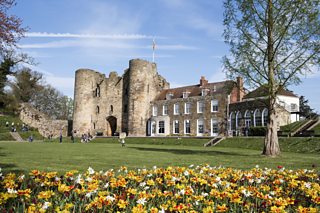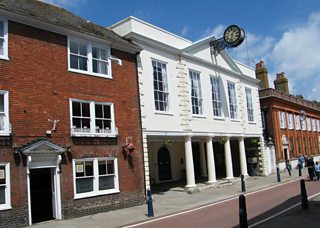Small towns big on Shakespeare
Returning to New Romney
New Romney’s population around William Shakespeare’s time is only thought to have been around 200-300 people. Yet Shakespeare’s company visited this tiny place at least three times between 1609 and 1615.
The fact that the town already had already hosted a series of large-scale passion plays in Elizabethan times had established its reputation for having a fine taste in historical drama.
-
![]()
Much ado near me
Hear more Shakespeare stories on BBC Radio Kent
-
![]()
Shakespeare Festival 2016
The BBC celebrates the genius of the bard
If Shakespeare himself had been travelling with his troupe on its final visit to New Romney around 1615/16, it would have been a rare and late chance to see him before his death in Stratford-upon-Avon in 1616.
Town records show that Shakespeare’s Company visited New Romney as The King’s Men in 1609 (when the town authorities paid them £1), 1612 (when they were paid another £1) and 1615-16 (when 2 shillings 8 pence was spent on entertaining them).
We do not know where the players performed, but they were rewarded by the city authorities, so there is a good chance that they gave at least one performance before the local mayor and freemen of the town, perhaps at the old town or market house (now lost).
In other communities it was usual for local people to be invited to see the ‘mayor’s play’. This may have happened in New Romney, too, in which case The King’s Men’s performance could have been seen by a large part of this small community.
The records don’t tell us which plays Shakespeare’s company performed, but in 1609 their touring repertory probably included his latest plays Cymbeline and The Winter’s Tale, plays that reflect Shakespeare’s new interest in the genre of romance or tragicomedy – a genre that was also currently fashionable on the stages of London.
In 1611 we know that Shakespeare’s company performed Macbeth, Cymbeline and The Winter’s Tale at the Globe Theatre in London (as astrologist-cum-quack physician Simon Forman has left us descriptions of the performances he witnessed of these plays); and the company performed The Tempest and The Winter’s Tale at Court (1611-12).
This could mean that these plays were also in the touring repertory and available for performance in New Romney in 1612, while in 1615-16 the company would have had the option of performing any of Shakespeare’s plays, as all of them had been written by this time.
Why were acting groups being prevented from performing?
By Alan Somerset, Professor Emeritus, University of Western Ontario
Bans on travelling players didn't happen frequently, but they did happen.

We see it happening in Hythe in Kent, but it took place too in other parts of the country, even in Shakespeare’s home town of Stratford-upon-Avon!
Sometimes there were blanket bans - playing was simply forbidden anyplace in a town. Word would get around among the travelling troupes who would simply go elsewhere, somewhere where there would be a welcome.
Sometimes a restriction would be put on playing in, say, the town hall, or a prohibition against any town funds being spent on playing. Then the players could play in another venue, such as an inn.
At Stratford they banned the use of town funds, and any part of the Guildhall buildings or grounds - this would not prevent players from setting up in an inn. What is remarkable at Stratford is the hysterical tone of the second ban, and the HUGE fine that was to be levied - this was rethought a few months later when saner heads prevailed.
Why did these bans occur, in whatever form we find them? There are a number of ostensible reasons, such as town poverty or fear of the spread of plague, but behind many of them was an unspoken motive: Puritanism. This was behind events in Stratford (which had, at different times, markedly Puritan clergy) and Hythe.
The other thing about these bans was that they were by definition impermanent - a council, in any year, was free to amend or undo the decrees of a predecessor council. But in practice there was great continuity of personnel on councils from year to year, so changes might come about only slowly. Or a council might decide to make an exception.
It is also apparent that hostility to players became more widespread as time went on and Puritan sentiment became more widespread. Then came the Civil Wars, when Parliament banned playing altogether, everywhere.
Tonbridge and a murder mystery
Dr James Gibson, REED editor of Kent:
On June 26 1610 a fight broke out in a Tonbridge playhouse and a man called Edward Calverley received a fatal stab wound to the head.

The question of who committed the killing was resolved in a court of law a year later. But for historians, another mystery was why a small town such as Tonbridge should afford itself a playhouse, a rare thing outside of London at the time.
More tantalisingly perhaps: was it in fact Shakespeare’s troupe The King’s Men who were performing when the fatal assault took place?
We know that Tonbridge had a close connection with two powerful barons who also supported Elizabethan players and playhouses. These two men, Henry and George Carey, together sponsored Shakespeare’s company The Lord Chamberlain’s Men.
The town was also granted, by royal consent, permissions to hold three annual fairs in Tonbridge – events which drew large crowds from surrounding villages, and guaranteed an audience at the playhouse for touring troupes such as Shakespeare’s.
We also know from records that Shakespeare’s men were touring Kent during 1610, so were they visiting Tonbridge at this time of the midsummer fair, when as the inquest report noted there was a fatal stabbing in “a certain house called a playhouse”.
Unfortunately the town did not have a mayor at the time and did not keep annual accounts and records of payments, so the evidence remains circumstantial.
Shakespeare on Tour
From the moment they were written through to the present day, Shakespeare’s plays have continued to enthral and inspire audiences. They’ve been performed in venues big and small – including inns, private houses and emerging provincial theatres.

BBC English Regions is building a digital picture which tracks some of the many iconic moments across the country as we follow the ‘explosion’ in the performance of The Bard’s plays, from his own lifetime to recent times.
Drawing on fascinating new research from Records of Early English Drama (REED), plus the British Library's extensive collection of playbills, as well as expertise from De Montfort University and the Arts and Humanities Research Council, Shakespeare on Tour is a unique timeline of iconic moments of those performances, starting with his own troupe of actors, to highlights from more recent times. Listen out for stories on Shakespeare’s legacy on your BBC Local Radio station from Monday 21 March, 2016.
You never know - you might find evidence of Shakespeare’s footsteps close to home…
Craig Henderson, BBC English Regions
Hythe: Paid not to play
Shakespeare's company played in Hythe on 16 May 1609. The town's records from 1610 include a payment of 20 shillings "to the kynges players 16 of maye last." The records don't tell us which play The King's Men performed, but the one new play by Shakespeare generally assigned to the 1608-1609 winter season was Coriolanus.

Although the troupe visited Hythe on six further occasions, this performance in 1609 may have been the last time that Shakespeare's company actually performed in the town. On subsequent occasions on visiting the town, records show they were paid not to play! This was presumably due to a growing puritanical influence among the town’s leaders.
On 24 April,1615 (the year before Shakespeare’s death and his final period touring) the Mayor and luminaries of Hythe passed an ordinance forbidding the performance of plays on the Sabbath day; restricting the number of performances that any company of players could perform; setting a curfew of eight o'clock in the winter and nine o'clock in the summer for the completion of a play performance; and prescribing fines of 20 shillings for any inhabitants who attended unauthorised plays or who "suffer any players to play in theire (sic) houses or backsides contrary to this decree."
Significantly, the ordinance authorised the mayor once in every year to pay any company of players 10s. "as a gratuety or benevolence in that they forbeare to playe heere."
Accordingly, on 21 August 1618, when The King's Men next came to Hythe, a payment of 10s, was paid "to ye kings players by Master Groves appointment deputie to master maior," presumably as a gratuity not to play.
Similar sums were paid to The King's Men on 20 March 1620 and again sometime between 2 February 1622 and 2 February 1623. The following year on 7 July 1623, the gratuity paid to the King's Players was reduced to 5s. by "master maior & ye Iurates appointment." The next year between 2 February 1624 and 2 February 1625 the gratuity to "the kinges players" dropped further to 2s.
The final time the King's Men came to Hythe, sometime between 2 February 1626 and 2 February 1627, they were once again paid a gratuity of 5s. "by the appoyntment of master maior" not to play.
-
![]()
Shakespeare Lives
The nation’s greatest performing arts institutions mark 400 years since the Bard's death
Related Links
Shakespeare on Tour: Around Kent
-
![]()
Touring Kent to avoid the plague in London
Shakespeare's Lord Strange’s Men perform in Kent
-
![]()
‘Wherefore to Dover?’
Dover, Faversham and the 1597 tour
-
![]()
A rare example of a surviving Shakespearean venue
Likely to have staged a Shakespeare play during the dramatist’s own lifetime
-
![]()
Mrs Hamblin - A woman scorned
The tumultuous private life of a famous American actress
-
![]()
Sir Edward Dering – Proud owner of Shakespeare’s First Folio
And possibly the host of the first amateur performance of Shakespeare
-
![]()
Dover Theatre and Miss Davenport
'The juvenile actress of the day'
Shakespeare on Tour: Around the country
-
![]()
A horse! A horse! My kingdom for a horse!
King Richard III's horse White Surrey is the star of the show
-
![]()
Modern day Macbeth for Corby steel town
The adaptation encouraged younger viewers to connect to Shakespeare
-
![]()
Sarah Siddons plays Hamlet in Liverpool
Actress becomes first woman known to have played Shakespeare's Prince of Denmark
-
![]()
Child prodigy actor prepares to retire as he headlines in Newcastle
W.R. Grossmith says farewell to the stage at 11













